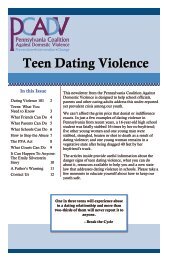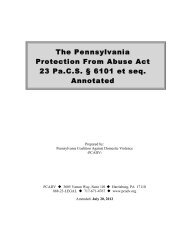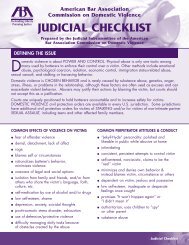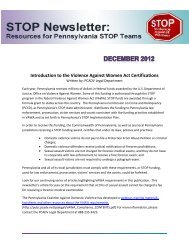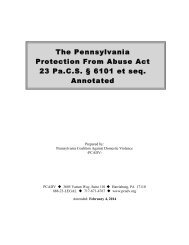Toolkit with Report Form - Pennsylvania Coalition Against Domestic ...
Toolkit with Report Form - Pennsylvania Coalition Against Domestic ...
Toolkit with Report Form - Pennsylvania Coalition Against Domestic ...
Create successful ePaper yourself
Turn your PDF publications into a flip-book with our unique Google optimized e-Paper software.
Media Tips for Victims & Families<br />
You Have the Right to:<br />
◗ Tell your story.<br />
◗ Say “NO” to an interview (even if you<br />
have given interviews to other reporters.)<br />
◗ Select a spokesperson to speak for you and<br />
your family.<br />
◗ Set the time and place for the interview.<br />
◗ Have someone <strong>with</strong> you during the<br />
interview.<br />
◗ Provide a written statement instead of<br />
giving an interview.<br />
◗ Give, or refuse to give, photographs.<br />
◗ Ask that offensive pictures and footage not<br />
be used.<br />
◗ Exclude children from interviews.<br />
◗ Decline to answer specific questions.<br />
◗ Demand a correction when the facts in a<br />
report are inaccurate.<br />
◗ Request or deny interviews <strong>with</strong> specific<br />
reporters.<br />
◗ Be treated <strong>with</strong> dignity and respect by the<br />
media.<br />
◗ Grieve in private.<br />
◗ Avoid a press conference and speak to one<br />
reporter at a time.<br />
◗ Refrain from answering media questions<br />
during trials.<br />
Drawbacks of Speaking to the Media<br />
◗ May be misquoted.<br />
◗ Lose anonymity.<br />
◗ Compromise physical safety or<br />
psychological well-being.<br />
◗ May impede the criminal case.<br />
◗ May feel exploited.<br />
Questions To Ask:<br />
◗ What is this story about?<br />
◗ How will the interview be used?<br />
◗ Who else will be interviewed?<br />
◗ What questions will be asked?<br />
◗ Is TV/radio interview live or taped?<br />
Interview Tips:<br />
◗ Write an outline or statement in advance.<br />
◗ Keep your answers brief and positive.<br />
◗ Set limits. You can tell the reporter you won’t<br />
discuss some things.<br />
◗ Remember, once you have said something<br />
you can’t take it back.<br />
◗ Don’t go “off the record.” Assume<br />
everything you say will be used.<br />
◗ Don’t guess or speculate.<br />
◗ Remember you are really speaking to your<br />
interviewer’s audience.<br />
Section Six<br />
Why Speak to the Media:<br />
◗ Influence public opinion and policy.<br />
◗ Help law enforcement catch criminals.<br />
◗ Prevent others from becoming crime victims.<br />
◗ Gain a sense of control and empowerment.<br />
◗ Achieve more accurate and sensitive<br />
coverage.<br />
◗ Get your message out.<br />
◗ Educate the public about your experience.<br />
When You are Misquoted<br />
or the Story is Wrong:<br />
◗ First decide if the error is important enough<br />
to pursue.<br />
◗ Call the reporter and request a correction. If<br />
you don’t get satisfaction, contact the editor.<br />
◗ Consider writing a letter to the editor to<br />
correct the record. A correction is in the<br />
editor’s words. A letter to the editor is in your<br />
own words.<br />
When Crisis Strikes | <strong>Pennsylvania</strong> <strong>Coalition</strong> <strong>Against</strong> <strong>Domestic</strong> Violence | 2012<br />
page 43



